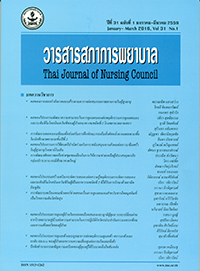ผลของโปรแกรมสร้างเสริมการจัดการตนเองต่อความรู้ พฤติกรรม การจัดการตนเองและระดับฮีโมโกลบินเอวันซีในผู้เป็นเบาหวานชนิดที่ 2 ที่ได้รับการรักษาด้วยยาฉีดอินซูลิน
Keywords:
โปรแกรมสร้างเสริมการจัดการตนเอง, ความรู้, พฤติกรรมการจัดการตนเอง, ผู้ป่วยเบาหวานชนิดที่ 2, ยาฉีดอินซูลิน, ระดับเฮโมโกลบินเอวันซี HbA1c, self-management programme, knowledge, self-care behaviour, type-2 diabetes patients, insulin- dependent, HbA1c (haemoglobin AAbstract
บทคัดย่อ: วัตถุประสงค์ของการวิจัย: เพื่อศึกษาผลของโปรแกรมสร้างเสริมการจัดการตนเองต่อ ความรู้ พฤติกรรมการจัดการตนเอง และวัตถุประสงค์ระดับฮีโมโกลบินเอวันซีในผู้เป็นเบาหวาน ชนิดที่ 2 ที่ได้รับการรักษาด้วยยาฉีดอินซูลิน
การออกแบบวิจัย: การวิจัยกึ่งทดลอง แบบสองกลุ่ม วัดผลก่อนและหลังการทดลอง
วิธีดำเนินการวิจัย: กลุ่มตัวอย่าง คือ ผู้เป็นเบาหวานชนิดที่ 2 ที่ได้รับการรักษาด้วยยาฉีดอินซูลิน ที่มารับบริการที่คลินิกเบาหวาน โรงพยาบาลราชบุรี จำนวน 50 คน คัดเลือกกลุ่มตัวอย่างตามคุณสมบัติ ที่กำหนด และทำการสุ่มอย่างง่ายเข้ากลุ่มควบคุม และกลุ่มทดลอง กลุ่มละ 25 คน กลุ่มควบคุมได้รับ การพยาบาลตามปกติ กลุ่มทดลองได้รับโปรแกรมสร้างเสริมการจัดการตนเองเป็นระยะ เวลา 8 สัปดาห์ ประกอบด้วย 1) การเตรียมความพร้อมโดยการทบทวนความรู้และฝึกทักษะการจัดการตนเองสำหรับ ผู้เป็นเบาหวาน 2) การติดตามเยี่ยมบ้าน และ 3) การติดตามเยี่ยมทางโทรศัพท์ เก็บข้อมูลโดย ใช้แบบสอบถามความรู้และแบบสอบถามพฤติกรรมการจัดการตนเองในผู้เป็นเบาหวานชนิดที่ 2 วิเคราะห์ข้อมูลโดยใช้สถิติเชิงพรรณนา และสถิติที
ผลการวิจัย: พบว่า หลังการทดลองกลุ่มทดลองมีคะแนนเฉลี่ยความรู้ และพฤติกรรม การจัดการตนเองมากกว่าก่อนการทดลอง และมากกว่ากลุ่มควบคุมอย่างมีนัยสำคัญทางสถิติ (p< .001) และหลังการทดลองกลุ่มทดลองมีค่าเฉลี่ยของระดับฮีโมโกลบินเอวันซีน้อยกว่าก่อน การทดลอง และน้อยกว่ากลุ่มควบคุมอย่างมีนัยสำคัญทางสถิติ(p< .05)
ข้อเสนอแนะ: ผลการวิจัยนี้แสดงให้เห็นว่าโปรแกรมสร้างเสริมการจัดการตนเอง มีผลให้ ผู้เป็นเบาหวานมีพฤติกรรมการจัดการตนเองดีขึ้นและมีระดับเฮโมโกลบินเอวันซีลดลง พยาบาล สามารถใช้โปรแกรมนี้เป็นแนวทางในการดูแลผู้เป็นเบาหวานชนิดที่ 2 ที่ได้รับการรักษาด้วยยาฉีด อินซูลิน เพื่อให้สามารถควบคุมระดับน้ำตาลในเลือดได้อย่างมีประสิทธิภาพ
Abstract: Objective: To study how a self-management practice programme could
contribute to the knowledge, self-management behaviour and HbA1c level of type-2
diabetes patients treated with insulin.
Design: Two-group experimental research with a pre-test and a post-test.
Implementation: This study was conducted on 50 purposively sampled insulindependent
type-2 diabetes patients being treated at the Diabetes Clinic of Rajburi Hospital.
The patients were randomly sampled and equally divided into a control group and an
experimental group. Whilst the control group was given standard treatment, the experimental
group participated in an 8-week self-management practice programme that incorporated
(1) a preparatory review and self-care training session for diabetics; (2) follow-up
visitations; and (3) follow-up telephone calls. Data were collected through an information
questionnaire and a self-management behaviour questionnaire for type-2 diabetics.
The data were analysed using descriptive statistics and t-test statistics.
Results: After participating in the self-management programme, the experimental
group members showed a significant increase in its average self-management knowledge
and self-management behaviour scores (p < .001), as well as scoring significantly
higher than their control group counterparts (p < .001). In addition, the experimental
group’s average HbA1c level decreased significantly after the programme, and was
significantly lower than that registered by the control group (p < .05).
Recommendations: This study has shown that the self-management programme
contributed to the improvement of diabetics’ self-management ability and decrease in
their HbA1c levels. It is suggested that this programme be adopted as a pilot approach
to controlling blood sugar levels in insulin-dependent diabetes patients.
Downloads
References
American Diabetic Associate.Standards of medical
care in diabetic 2010.Diabetic Care 2010; 33(1):
-48.
Nakar, S., Yitzhaki, G., Rosenberg, R.,& Vinker,
S. Transition to insulin in Type 2 diabetes: family
physicians’ misconception of patients’ fears contributes
to existing barriers. J Diabetes Complications 2007;
(4): 220-26.
Funnell, M. M., Kruger, D. F., & Spencer, M. Selfmanagement
support for insulin therapy in type 2
diabetes. Diabetes Educator 2004; 30(2): 274-80.
Peyrot, M., Rubin, R. R., Lauritzen,T., Skovlund,
S. E., Snoek, F. J., & Matthew, D. R. Resistant to insulin
therapy among patients and providers: Result of the cross-
National diabetes attitudes, wishes, and needs (DAWN)
study 2005; Diabetes Care, 28(11): 2673-79.
Reid, T. S.. Insulin type 2 for diabetes: Separating
the myths from the facts; Insulin 2007; 2(4): 182-89.
Zambanini, A., Newson, R.B., &Maisey, M. Injection
related anxiety in insulin-treated diabetes. J Clinical
Pract 1999; (46): 239-49.
Coates, V. E., &Boore, J. R. R. Self-management of
chronic illness: Implications for nursing. International
J Nurse Student 1995; 32(6): 628-40.
Jintana Tongpeth. Effectiveness of Self-Management
Promoting Potential Program on Blood Sugar Control
and Quality of Life Among Diabetes Mellitus Type 2.
Journal of The Royal Thai Army Nurses 2013; 14(2):
-78. (in Thai)
Ratchawan tookaew. Effects of self-Management
promotion program on self-management practice
and hemoglobinA1c level among the elderly patient
Diabetes Mellitus Type 2. [Master’ thesis] Burapha
university; 2010. (in Thai)
Waraporn Deeseang. Effects of self-management
program on hemoglobin A1c and LDL-cholesterol
level of type 2 diabetic patients. [Master’ thesis]
Chulalongkorn university; 2009. (in Thai)
Sansanee kongsakul. The effects of a self-management
skill training program on self-management behaviors
regarding glycemic control and blood sugar level
among persons with type 2 diabetes mellitus. [Master’
thesis] Thammasat university; 2010. (in Thai)
Saowaluck kontawee. Effects of self-management
program and quigong on hemoglobin A1C and blood
pressure in diabetic retinopathy patients. [Master’
thesis] Chulalongkorn university; 2010. (in Thai)
Ngampit Thanapaisal. The effect of preparatory
information regarding CAPD catheter insertion and
music therapy on anxiety and patient satisfation,
Srinakarin. [Master’ thesis] Khonkaen university;
(in Thai)
Bossakorn Binthasun. Music Therapy. Bangkok:
Chulalongkorn university; 2013. (in Thai)
Bureau of Alternative Medicine Department for
Development of Thai Traditional and Alternative
Medicine Ministry of Public Health. music therapy.
Bangkok: Sukhumvitmedia marketing company;
(in Thai)
Kanfer, F. Self-management method. In F. Kanfer
& A. Goldstein (Eds.), Helping people change: A
textbook of methods 3rd ed. New York: Pergamon
Press; 1988: 283-338.
Polit, D, Beck C. Inferential statistic. In nursing research:
Generating and Assessing Evidence for
Nursing Practice. 9th. Philadephai: Wolters kluwer
health/Lippincott Williams; 2012: 404-32.








